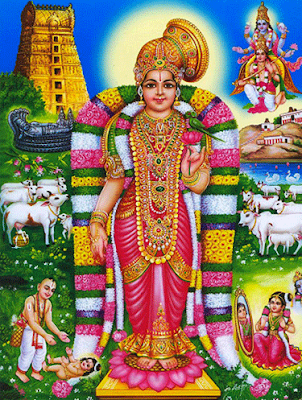Without fail my lovely R drops me an email and writes:
Dear E,
Remembered you on this day of Marghazhi 1st - you, your blog, your post, pic of andal in post, your amma's pongal description, your narration of this month's speciality...
and I can't help smile. R has this amazingly simple and innocent way of touching people's lives that I feel amazed, honoured and flattered (all at once) to know that there is some post that has touched her. Here it is and here too (just realised I had two posts). The former is a post I wrote back in 2007 (for a Margazhi that started in 2006). This post is dedicated to this dear friend of mine.
I wonder what aspect of Margazhi I can capture in this post and am at loss of words. Such a quandary is not a result of little else to speak about regarding a month when the God Himself is said to descend to the Earth. Surely one can say enough about the music, the rituals, the distant chants streaming through orange street-light. While there is so much to write I choose to pick one aspect of Margazhi which I haven't yet understood myself. This post will be unlike the earlier one in being less nostalgic and more reflective.
Andal, in essense, created Margazhi and the entire pavai tradition. While girls her age might pine for the handsome boy down the street, Andal sought none other than Sriman Narayana Himself. Sets quite a high bar. Her 30 paasurams fit well into the month of Margazhi with Margazhi Thingal being the first paasuram. The paasuram goes as follows:
Tamil:

English:
Margazhi thingal madhi niraindha nannaalaal
neeraada podhuveer podhumino naerizhaiyeer
seer malgum aayppaadi chelva chirumeergaal
koorvael kodundhozhilan nandhagopan kumaran
Aeraarndha kanni yasodhai ilam singam
kaar maeni cengan kadhir madhiyam pol mugaththaan
naaraayanane namakkey parai tharuvaan
paaror pugazha padindhelor empaavaay.
Translation:
On this day (commencing) the month of Margazhi
Which is like a moon in full resplendence,
Come quickly, young girls, oh so decorated,
And we shall bathe in the river. Oh girls with good qualities
And the prosperous ones from Aayarpadi (Gokulam), come.
Come for the sake of the son of Nanda,
One with a sharp pointedness in destroying all evil
One who wears fragrant garlands
And is the young lion of Yashoda
The dark hued, one with lotus (bud) shaped eyes
Whose face is as brilliant as the sun and moons (kadhir, madhiyam pol mugatthan)
That Narayana will Himself grant us deliverance
Let us sing praises to Him and worship Goddess Pavai who will grant us our wish (to unite with Him)
Of course, I paraphrase. Nevertheless, the intent is as stated above in the translation. Interpretations and extrapolations are possible and are left to the committed few.
I have heard this paasuram sung for several years without fail and I wonder at the immense love and clarity Andal must have had in knowing that Sriman Narayana is all she would ever need or want. Such single-minded devotion is not a decision or a resolve but a whole-bodied way of being. Neither you nor I could suddenly be impassioned into deciding that come tomorrow and we shall be as devoted to the Lord as Andal was. Devotion is not a decision for it come without religion (which is a decision or, as is often the case, a conditioning). Devotion is clarity and (for the lack of a better word) completeness.
I have never felt that though I know it and like one listening to a beautiful song sung in a language I don't understand, I listen to the paasurams sung and wonder how could someone love anyone (even the Lord) so much? The tales of Hanuman are also testimony to such love (and with that example, one realises such love to be clearly asexual). Personally, I consider Hanuman to be the best and most honourable character in the whole of the Ramayana for he could realise the Lord while the Lord himself was unclear about his nature.
Andal's love for Krishna is legendary and tales of Andal are told to young children (well, no more given that Nick and Cartoon Network have better tales) and girls dream of loving someone like that. But then they grow up and in that act there is inherent tragedy.
Margazhi is fragranced with the love of Andal and one can feel the conviction, the clarity and the sheer devotion of it all in her paasurams. Margazhi is when the Lord is most pleased. Margazhi is when the Lord nodded to Andal's question (10th paasuram): For a young delicate girl who has undertaken such a vow (of paavai), won't you open the door to your abode?
Hanuman's glory, Andal's beauty - both divine in their influence on me.
ReplyDelete